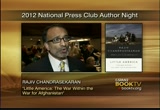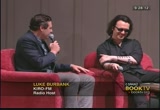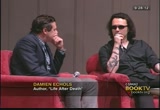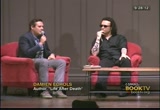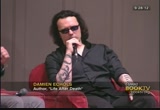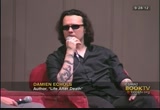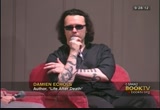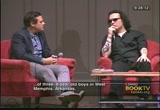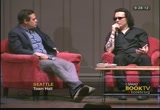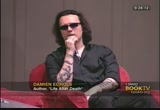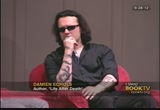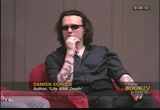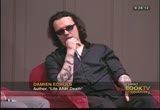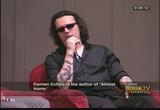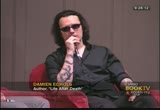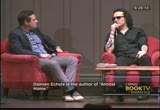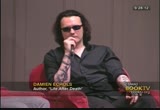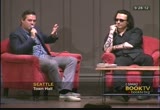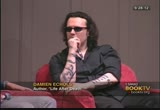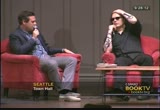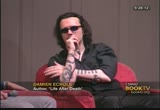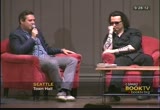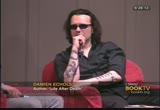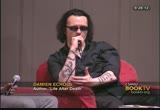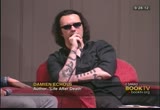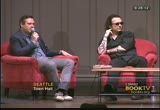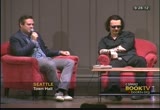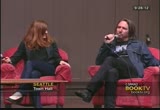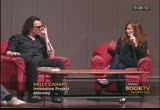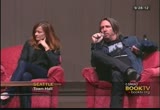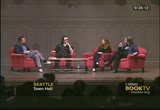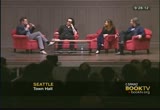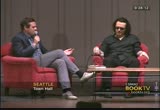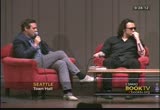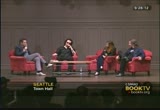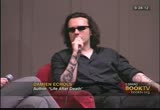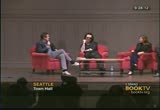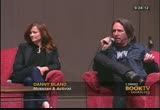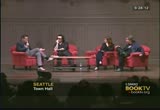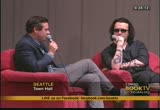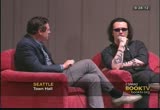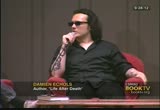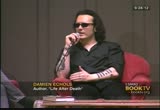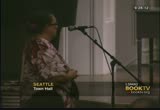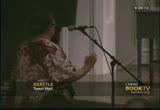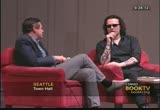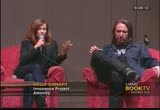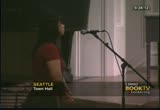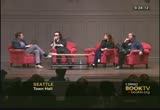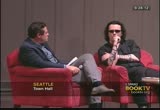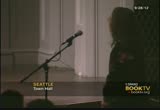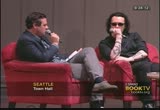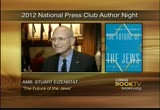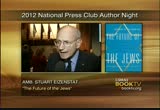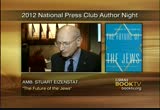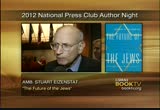tv Book TV CSPAN November 24, 2012 12:00pm-1:15pm EST
12:00 pm
there was a period of great optimism that afghanistan would be able to build a more stable democratic society. but then we took our eye off the ball, as many americans know, and we focused on iraq. what that allowed was the taliban to surge back in. and, unfortunately, i think what we're seeing now is a period of a real mixed bag, if you will. there has been some real gains paid for by the lives and limbs of many americans, many american service members. and we have beaten back the taliban in places. security has improved. but there are real questions as to whether any of that can be sustained l the afghan government, whether its army and police force will really be able to take the baton from american forces as they start coming home over the next couple of years. >> host: "the imperial life in the emerald city" was about baghdad. "little america" is about afghanistan. >> next on booktv, damien
12:01 pm
echols recalls his arrest, incarceration and eventual release for the murder of three 8-year-old boys in 1993. mr. echols and two other men, jesse and jason baldwin dubbed the west memphis three, spent 17 years in prison. mr. echols discusses the case and his time spent on death row at town hall seattle. it's about an hour, ten. [applause] >> um, thank you guys for coming out tonight. damien, thank you very much for coming all the way to seattle. >> thank you for having me. >> um, you have been through something that i think not that many people have been through, a sort of grind that feels like it might never end and sort of you wonder if one day will just run into the next. and i speak, of course, of the media tour you've been on for this book. [laughter]
12:02 pm
"life after death." what is more mundane, prison or doing a book tour? [laughter] >> in some ways the book tour's actually a little more stressful. [laughter] at least when you're in prison, you're not being stared at by 400 people. [laughter] >> um, can i just get a show of hands, how many people know about damien's story because of the paradise lost films? i was really, i was surprised to read in your book that when those hbo producers showed up, they weren't there to shoot a movie about how three men were -- or boys at that time -- were wrongly convicted, right? that was something they figured out while they were shooting what they thought was a movie about satanic murders? >> exactly. what we were told was there was a very small article in "the new york times" that sheila nevins saw in the paper, and she thought it was an open and shut
12:03 pm
case. so she contacted joe and bruce and told them why don't you get your cameras and get down there in the courtroom and get this. after they started filming it, they realized, um, it wasn't exactly what they had been led to believe it was, and thankfully, they got the entire trial on tape. and they took part of it and made a documentary out of it. >> was that part of your thought process in allowing them to interview you and film so many of these kind of important and intimate things for you, was to try to get the word out? did you have a sense of that even back then when you're like a, what, 18-year-old kid or something? >> i don't think i really had a sense of that, i just felt like i didn't have anything to hide. i had nothing that i was trying to cover up, there was nothing that i didn't want the cameras to capture. so i said, let 'em in. doesn't bother me. but at the same time i think i was still in such a state of shock and trauma that i probably wasn't thinking much of anything at all. >> let's talk about your
12:04 pm
childhood a little bit because you write about it in the book. by your own description, it was at times pretty bleak. would you say you had a sort of average childhood for that part of the world, or were you more unfortunate than some other kids in terms of how you lived and your stepfather and sort of the bullshit you put up with? >> i think in some areas of the south, i think it was pretty typical. in the south you usually have, you know, all these class divisions like, um, you know, what people usually think of as redneck, and then you have what we were which was even below that which is just like white trash. we had absolutely nothing when i was growing up. dirt poor doesn't even come close to articulating it, you know? when we did finally move up into a trailer park, to us that was taking a huge step up in the world. we had running water, electricity. that was the lap of luxury after what we had experienced. there was times when i was a kid
12:05 pm
that we live inside places where we would literally have to haul water in this buckets back to the house and then heat it over a fire and pour it into the tub just to take a bath. >> did that feel to you like that was going to be the rest of your life in one way or another, being a pretty poor person in that part of the world, or did you kind of have aspirations and dreams to get out of there? >> i did. i wanted to get out of there. but at the same time it's almost like that was all i'd known my entire life, so there was part of me that didn't believe that anything else actually existed. you know, when i would watch tv shows about, you know, places like new york or los angeles, or i would see shows where people went to college, to me that was something that, um, it didn't really exist, you know? it's on tv, but i don't think there was anybody in our world that ever experienced anything like that. you know, i have a ninth grade education, and that's more than anybody else in my family does.
12:06 pm
so i wanted out, but at the same time part of me didn't believe it was even possible to get out. >> as everybody in this room knows, you were a teenager when the police swept you up and, basically, put you on trial for the murder of these three boys. what was the point, if there was one, where you realized this was really happening? i mean, actually not a mistake, not something that was going to be ironed out with one phone call? was it when you were arrested? was it during the trial? was it ten years into being in prison? >> it happens gradually. you sort of go back and forth. when they arrested us, i was little more than a child myself. i was 18 years old, and i was still very, very naive about how the system worked. you know, i'd been raised with this belief that, you know, the system is based on innocent until proven guilty, and i thought there's no way they can actually prove you've done
12:07 pm
something that you haven't done, you know? that should be scientifically impossible. but it wasn't. um, they did it. and it was, that was when part of it clicked into place, whenever they come back and say guilty. but there's also when they start sentencing you to death, you know? not once, not twice, but three times. that's when you realize nobody's going to step in and help you. nobody's going to put a stop to this. >> did you think there was a pretty good chance you would be executed for this? >> i think most of the time, no. after i saw how corrupt the system was from the inside, i lost all faith, all hope, all belief that the system was ever going to right its wrongs. but in '96, whenever the documentary started coming out and i started hearing from people all over the world and as technology kept expanding and
12:08 pm
more and more people would hear about the case and start, you know, doing benefit shows or writing letters or even making donations to the defense fund, whatever it was, that's what kept me going. that's what i had faith in, that's what i had belief in, the outside world, people who were doing whatever they could. that's the reason i thought i wouldn't be executed. >> did the paradise lost movie ever show in the prison? >> never. i tried to watch it one time. um, the attorney i had got a court order from the judge, he said, well, this is relevant to the case, so he should see this. so they set up a tv, they put me in a cell with a tv, they started playing it, i made it through maybe 15 minutes of it, and i couldn't take any more. i understand why they had such a huge impact on people, because for me watching it again, the closest thing i could compare it to was when you hear vietnam vets talk about having flashbacks? that's what it was like, it was like being there in the courtroom again, and it's so overwhelming that you don't know, you just feel something
12:09 pm
huge, but you don't know if you should be laughing or crying. you're just -- i don't think there's even any words in the english language to articulate how it makes you feel, what it does to you. so i couldn't watch the whole thing. i didn't watch any of the second one. i watched the third one just because we went to the premiere in new york, but i honestly don't remember most of it because it happened right when i had just gotten out of prison, and i was still in a really, really deep state of shock, and i don't remember a lot of what happened in the first month or two that i was out even. >> is there a misperception when people meet you now or see you at a premiere like that where they figure you're out, so you just must be happy-go-lucky, and you're still feeling a lot of this stuff? >> yeah, i think there is. i mean, there is a tremendous amount of anxiety and stress and can all sorts of other stuff.
12:10 pm
you know, i was in solitary confinement for almost ten years, whenever i got out. so i went from that one day to almost a decade of solitary confinement to just being thrown back out in the world, and i wasn't ready for the sensory overload that it was going to bring. and i had to learn, you know, old things over again while learning new things at the same time. i had to learn to walk again, uming -- um, for almost 20 years i hadn't walked anywhere without chains on my feet. so i would trip over my own feet, i almost had to be led around like a blind person. my eyes are getting better now, but my eyesight was wad -- bad first getting out. >> let's talk about that. i thought you were just being a cool customer with your sunglasses on. those are prescription, and that's a result of having been incarcerated. >> i can see probably 4 inches in front of my face without
12:11 pm
those glasses. i didn't see sunlight for almost ten years, and i was kept in a really small space, and your eyes never have the chance to see anything more than, you know, a couple feet away. so you gradually lose the ability to focus on things. um, i can't even see arm's length anymore. >> you write about the brutality of these guards in various jails that you were in -- prisons, rather, that you were in. and i'm wondering, do you think that -- and this is sort of speculating on your part, but do you think that's unique to those particular prisons, or do you think that's across the u.s.? because the brutality's almost unbelievable. >> it's hard to say. i've heard of other prisons. you know, they're always going to keep stuff like that covered up, you know? they're never going to allow a camera into a prison when, you know, the most brutal things are going on. if they do ever allow a camera in, it's going to be in a very tightly-controlled situation.
12:12 pm
you know, they're not going to do the things they would normally be doing to someone while someone from the outside is there watching. you have all the time in the u.s., you have prisons that are on the verge of of riots, that are, you know, prisoners going on strike, refusing to work, they have to shut the whole prisons down, and people out here never hear of it because they say if it's reported in the media, it'll make the prisoners even more aggressive, even more bold. they'll say, okay, the world's paying attention, someone's watching, someone's seeing what we're doing, and it'll make 'em do it even more. so a lot of times you have prisons that are just erupting, and nobody out here even hears of it. >> do you have any sort of survivor's guilt in a way? because there are still guys on that death row that you left, certainly you didn't deserve to be there, but here you are out in the world. >> i don't know. um, maybe i was lucky.
12:13 pm
a lot of it was lori, my wife. um, she kept me sane, kept me moving forward. there were times when i felt like i couldn't get up and keep going, and she would make me, almost carry me motionally, psychologically. spiritually. when i just couldn't take another step, she would keep saying, no, you've got to, and she would make me laugh and make me look at things in a way that wasn't quite as serious. that and just spirituality, you know, meditation, energy work. in prison there's almost no medical care, dental care, things like that, for people on death row. they're not going to put a lot of time and energy and effort into taking care of someone that they plan on killing. so i started suffering a lot of health problems over the years. it started getting worse and worse, and the only thing i had to help me through that was the medication techniques -- meditation techniques and the
12:14 pm
energy work, things of that nature. that was what helped me make it through. it also kept me focused in the present moment. you have a lot of people in prison the reason they go crazy is because they're always looking towards some day in the future when they're going to be out, and that's what they're living for. it's like today doesn't matter. i'm always looking at some date five years down the road, ten years down the road, a day that may not even exist. but doing that routine, doing that work it kept me focused in the present moment which probably saved by sanity. >> do you think conceivably you could have lived out your days in that prison if you'd had to and had some relative measure of a, you know, to use a weird word, happy life? >> no. i think i would have probably lived maybe a year at the most longer. i weigh 60 pounds right now more than i did the day that i walked out of prison just because my health was getting so bad. that's why i took the deal.
12:15 pm
um, whenever we got out, we weren't completely exonerated. we had to take a plea called an alfred plea. it's very rare in the united states. most people have never even heard of it. what it amounts to is that you're accepting the plea the prosecutor is offering you, a guilty plea, but at the same time you get to maintain your innocence. so it's almost never used. and the reason it is used is so you can't sue 'em. whenever this plea came into the discussion, the prosecutor's first question was will they sign a waiver giving up all rights to sue the state of arkansas? and people ask, you know, did i have any reservations or, you know, did i have to, you know, fight with myself to come to the decision to accept that? the answer is, no, because i was dying. i was dying very quickly. there were times when i was so sick, i literally didn't think i was going to make it through to the next morning. so i knew if i didn't take that deal, i was going to die there. they could have easily stretched this case out another five years, another ten years. they could have appealed every
12:16 pm
decision, they could have constantly asked for extensions, and i would have died. >> has anybody from the state of arkansas or the county in which you were prosecuted, has anybody come close to saying to you we know you didn't do it, and by the way, we're really sorry that we did this to you for 18 years? >> no one involved in the system whatsoever. according to the state of arkansas, they still have not made a mistake. they still say in the appeals process that in arkansas they have never sent an innocent person to prison in the entire history of the state of arkansas. um, people have. people from arkansas, just everyday citizens. one came, actually, all the way over to new zealand. we were over there a couple months ago doing a screening of the documentary that's coming out in december called "west of memphis," and afterwards when it was screened, we would do question and answer sessions with the audience. and a guy stood up and said he
12:17 pm
had come all the way from arkansas, and he just wanted to say he was so sorry for ever thinking that we were guilty. and stuff like that means a lot to you. >> um, let's talk a little bit about your relationship with your wife, lori, who if you've read this book or if you've read other things damien's read, makes you want to go up and hug this woman if you see her on the street. in a noncreepy way. [laughter] she, it sounds like a pretty amazing person and a person who really kind of saved your life. you guys had this -- you were married, you had this incredibly intense relationship where your life is quite literally on the the line, and yet you've never been able to be together free walking the streets, and then one day you just live together, and you want to watch different tv shows. [laughter] is there a lot of pressure on the relationship to work when you were out? >> there's a lot of things like that, but at the same time after what we have faced, you know, it's a really small thing.
12:18 pm
there are compromises that we make a lot of times. one of the things whenever i first got out, i couldn't sleep without noise of some sort, so i would turn the tv on. and then i discovered all these things that didn't exist when i went in, like a tv channel that plays all horror moves 24/7. [laughter] and that's not lori's thing, you know, she watches french movies and, um, everything subtitled. [laughter] >> that is a good movie, if you haven't seen it, everything subtitled. [laughter] >> so when i would go to sleep at night, i started turning on this channel that played all horror movies, and after a week, she finally says i can't take this anymore. i cannot go to sleep to the sound of people screaming every night. [laughter] >> um, is -- putting aside the
12:19 pm
bizarre nature of your life where you come and sit in front of people like this and, i'm sure, are approached on the street often by complete strangers, putting that aside a little bit, is life on the outside the way you imagined it would be? is it as sweet and as satisfying, i guess? >> it is, but it's also -- i didn't realize how much anxiety and stress would come along with it, how much trauma, you know? i thought that when i walked out of prison, it would just be this extremely joyous occasion, and i didn't realize the state of shock i was going to be in whenever i came out. you know, i didn't take into account things like the fact that i hadn't been anywhere in 20 years. you know, for almost 20 years i had been sealed inside a box, so i never had to do things like navigate in the world, find my way from point a to point b, wherever it was. and then when i actually had to do those things and it became a reality, it was incredibly
12:20 pm
overwhelming and incrediblier terrifying. so i just started having to make myself do things that i was scared of on a daily basis; go places i didn't know, find my way to someplace. i kept having to force myself in situations. standing in the line at the bank, it terrified me. and i would have to force my way through these things just so that i could, um, you know, get beyond that. if i can do it one time, if i can make my way through it, i'm not scared of it anymore. it doesn't cause me as much anxiety. and i didn't have any idea the level of that sort of thing i was going to have to deal with. >> because of the alfred plea, as you mentioned, you are still in the eyes of the state of arkansas guilty of the murder of three young boys. and you're working, you and all the people who have helped you over the years, are working to try to raise money to try to mount, what, a challenge to that? to somehow have yourselves
12:21 pm
officially exonerated? what all does that involve? >> there's so much. right now according to the state of arkansas, in the case is closed. they're not going to do anything. at one time, whenever the dna testing was being done, they agreed to pay half the cost for the dna testing. we had to pay the other half. well, they never paid anything. we ended up having to pay the entire thing, and we had no money, no money. at one time lori actually had to take out two personal loans just to pay off legal fees. whenever it was time to do the dna testing, henry rollins had to go on a tour just to raise the money to have the dna testing done. the day that i got out, the attorney general called for an audit of the defense fund just because he could. um, it's one of those things that every single thing that's done in this case we have to pay for. there are still a lot of things being done, a lot of things that no one has heard about that we're having to carry the burden of.
12:22 pm
one thing, for example, whenever we found out that the dna at the crime scene matched one of the victim's stepfathers, we started doing more research into that, things like, say, track down the truck he owned at the time of the murder and do human knoll testing. that shows if there's been blood spilled anywhere in the area, and we did find there had been blood spilled in his pickup truck, but it was so old and degraded that we couldn't do anything with it. another one, we did the same thing with the kitchen of the house where he lived, and there was blood under the linoleum in the kitchen, but once again, it was so old and degraded, there was nothing we could do with it. stuff like this costs money, you know, it's not free, and the state will not do anything. according to the state of arkansas, they've got their guys, case closed. >> when i was doing some reading on the internet about your case and looking at some of the different web sites that have popped up related to it, there are a number of them that are maintained by people who think you guys did it and are very, very strident about that, very
12:23 pm
convinced. and i was surprised to see one of them had, like, 400 facebook likes. and, first of all, who likes that even if you think you did it? that's a weird thing to like. [laughter] but what do you think is in it for people that want to cling -- not the prosecutors or people that have professional interest, but just like average citizens? what's in it for them to cling to this notion that you guys did this? >> i honestly don't know. i think part of it is misinformation. you know, i've seen some of those things, and a lot of the stuff on them, you know, it's not very accurate. chunks of information are left out, things are taken out of context. so a lot of times i don't know if it's ignorance, if they actually believe what is there, or if they're deliberately being manipulative with the information and the evidence out there. i don't know, you know? i think a lot of times they're probably just crazy. [laughter] whatever it is, i try not to worry myself with it too much. you know, after you've been through the things that we've been through, you develop a kind of a thick skin where it takes a
12:24 pm
lot to bother you. >> what is your timeline for the point in your life when this is no longer going to be something you have to talk about day in, day out, think about, go on the internet and see what people are saying about? i mean, when do you, when do you think -- you'll never be past it emotionally, i would imagine, psychologically, but your life won't just be about the thing of being put in jail for a crime you didn't commit? >> i think it'll be whenever me and the other two guys, jason and jesse, are all three exonerated, whenever the person who belongs in prison is in prison and whenever the people who did this to us are held responsible for what they've done. [applause] this isn't fun for me, having to talk about this, having to relive this over and over, you know? i always tell people imagine the worst thing that's ever happened to you in your life and then having to talk about it five times a day every single day.
12:25 pm
it's not enjoyable. it's, it's like you can't even allow the wounds to start healing, because you're constantly having to pick the scabs off again. but we have to do it. like i said, the state of arkansas isn't going to do anything. if we just let it fade away, then none of those things that i just said will ever happen. it's up to us to keep pushing it forward with the book, with the documentary, with constantly continuing the investigation, of bringing up whatever we can. if we don't do it, no one's going to. >> you're clearly the sort of lead personnen o this, if -- person on this, if you will. you're the person who's written the books and who is, again, on stage here tonight. how are jason and jesse doing that you hear? >> jesse, he and i haven't had much contact. i've seen him once since we've been out, but from what i've heard, he never even really comes out of his house. you know, already he only had an
12:26 pm
iq of between 68 and 72, and then this scarred him so much that from what i've been told, he never comes out of his house, has no contact with anyone just because he's terrified that they're going to find some way to put him back in prison. jason actually lives here in seattle now. whenever we first got out, the morning after we got out we came here to seattle. he liked it so much that he never left. he decided he wanted to live here. he's in college at the present time here. what he wants to do is eventually go to law school and get his law degree and help people who were in the same situation we were in, but he can't even do that with a criminal record. once he gets his law degree, he still can't practice law until we're exonerated. >> you guys came here that day after you were released because i understand eddie vedder and his family -- i think eddie vedder's in a band -- [laughter] up and coming here in town.
12:27 pm
today brought you, they brought you here, right? and, like, took you shopping. >> eddie was, actually, in the courtroom the day we walked out. he came there just to be there for that. he brought us straight here. the day that we left arkansas, we left like refugees. i did not have a single penny in my pocket, i didn't even have a suit of clothes to change into. we had nowhere to go. so eddie brought us here, and his wife, jill, who's here tonight, um, took me out shopping and got me an entire new wardrobe, and i used to tell her eddie when he sees how much you spent, he's never going to let me back. [laughter] >> presumably, it was all black still? >> it was. >> with or did you change it up? >> yes, it was. [laughter] >> well, speaking of people who have been instrumental in damien's life and in trying to get more justice, a couple more
12:28 pm
people we want to bring up on the stage. writer and activist danny bland and also kelly canary who is, who's an attorney and worked with the innocence project. can we get them to come on up? [applause] how did you guys get involved in this whole thing? >> um, you know, what's the rules on cussing for this? >> i think it's -- i think damien's heard some swears before. >> i think it's encouraged. >> yes. >> really we were, actually, living in the same house, and we had, they used to have on hbo they used to have free weekends. so if it wasn't for a free weekend on hbo, we never would have seen the movie. [laughter] >> it's true.
12:29 pm
>> and i think like everybody else in this room, we saw the movies and were outraged, but also at the same time because it was made into a movie, sort of we thought that someone was taking care of it, so we sort of relaxed. but, you know, later on did some research online and figured out, you know, that they were still in prison, that nothing was being done, and, you know, that's when we decided it was time to do something. >> and then, kelly, i'm not sure if your microphone's working, by the way. you may have to share that with danny. i didn't realize this until we were talking before we came out here, you went to law school because of what you learned in trying to assist damien. >> well, yeah, i definitely went to law school after having -- like danny, we saw it together, and we're like, you know, how could this have happened? oh, well, somebody will get them out of jail tomorrow.
12:30 pm
i literally thought somebody smart, a lawyer or a judge would see the documentary, and i was so naive. i thought somebody would just let them out of jail, they would see the same movie danny and i saw and be like, oh, shit, sorry. [laughter] i think it was about a year later we found out that they were still in. and i just remembered thinking to myself, that doesn't seem right. and so i was in a band at the time, and i quit, and i decided to go back to school. and if not to help damien himself, then to at least do something. i just, i really couldn't believe that something like that could happen. i just never believed it could happen. >> and then, danny, you, i know, um, you've worked in the music. you put together or you were part of putting together a benefit album, right, that had a bunch of time, tom waits and others on it?
12:31 pm
>> yeah. at the time i was managing a band called the supersuckers, and i went on to wm3.org and, basically, reached out to them. i figured -- to me, it seemed like such a natural music-related issue or cause that i just assumed that there would be something like that in the works. so i called them up, or i got in touch with them and just volunteering the supersuckers to be on, to do whatever they needed to get done. turns out there was nothing being done at the time. and it was, it was a weird time. the first movie had just come out, and it was a little different. it wasn't sort of as blaringly obvious that they were innocent at the time. and so to convince a record company and sometimes to convince a lot of bands to get onboard was not as simple as it later on became. so, you know, i'm a pretty good con man, and so i conned a
12:32 pm
record label into giving us some money to put out a record and eventually made up a list of wouldn't it be nice sort of scenario with tom waits, joe strummer and the usual suspects and started picking them off one at a time, getting recordings with them. >> and how do you get a tom waits? do you just send him a dvd and say watch this and get back to me? i mean, how do you talk them into understanding calls for a legal opinion yen and the other guys' plights? >> well, tom waits is a weirdo. [laughter] at the time, it's when he first signed to epitaph, and he was having a fight with his manager at the time, too, so he wasn't taking phone calls. he had a fax machine. and somebody at the record label snuck me his fax number, and i wrote him a letter talking about the case and blah, blah, blah, and i just sent it, and i thought, well, my letter's at least laying on the floor at tom waits' house. [laughter]
12:33 pm
about two hours later, the phone rings, and can it's his wife. and you can hear tom in the background, like she's going, now, is this that case from that movie? and you can hear him in the back going blah, blah, blah. [laughter] so he just agreed on the spot to do it and, you know, in the mail a couple weeks later, his song showed up. everybody was quite gracious once they learned what was going on. i wouldn't name the bands that refused, but there were a few. there were a handful of bands that were just like -- >> when you can say it, limp biscuit. i mean, that's a commonly-known fact. [laughter] >> i'm offended that you would think i would ask limp biscuit -- [laughter] [applause] >> damien, how aware were you of all of this stuff that was gown on behind the scene -- going on behind the scenes from people like kelly and danny and maybe hundreds of others?
12:34 pm
i don't know. people in some way trying to assist you. when you're in solitary, is lori giving you reports, or is it too much information for you to process, you've got to focus on getting through that day? >> lori could tell me things, and i would receive letters and pictures and things like that from both danny and kelly and other people who were doing things that would send me reports of what's going on. but it's different when you're in there, and you're not seeing it firsthand, and it's just through a letter. you think, yeah, that's really great, maybe it's going to help, but at the same time you're just trying to keep yourself together for one more day and then one more day after that. you know? it's, it's -- you're so busy trying to survive that stuff like that almost seems a million miles away sometimes. >> what was the first moment if you can remember it, or if it happened this way, that you had a little spark of hope, you really thought people are
12:35 pm
getting this on a wider level that i'm not supposed to be here? >> i think that was a very gradual thing too. it started with, um, you would see every now and then a newspaper article that seemed like it wasn't completely and absolutely 100% against you and scream out for your blood. or i think i'd only been in prison for two days whenever i started hearing from people who said they didn't believe that i was guilty. it wasn't nearly as much as it would get later on, you know? as the years would progress, it would become more and more and more, almost like a tidal wave. but in the very beginning it was just a very slow trickle. but even that kept me alive, it kept me from feeling, you know, that we had been completely forsaken by the entire world. >> kelly, you went on to work with the innocence project which is an incredible organization, and, i mean, to talk about this task, i don't think you could
12:36 pm
pick a more stark example than what the innocence project tries to do which is, obviously, take on all of these cases -- hundreds, if not thousands of them -- and prove that a lot of these people should not be there. is damien's case even the worse one you've -- the worst one you've seen? >> well, it's the worst one i personally have seen because i know damien, you know? and i visited him in prison, and he was my friend. emotionally, yes, but legally not even close. i mean, there was cases where people were convicted where there was nine eyewitnesses that said he was actually in church that night, you know? and there's, i mean, all sorts, you know, here at the innocence project northwest where i worked here for a while, one of our clients was convicted, and victim had said the perpetrator was anywhere between 6-1 and 6-4, our client was 5-7.
12:37 pm
she said that the client was muscular, our client -- hopefully he's not here -- was not. [laughter] you know, it just goes on and on and on. i mean, these people are convicted on absolutely no evidence, and much like damien's case there was a false confession there, too, and, you know, they questioned him for nine hours, you know? they questioned him for nine hours, and much like in damien's case, too, none of the facts matched, so then they go back, and they question them again. and then some of the facts match because, you know, the police are feeding them facts, and then, you know, they go back a third time, and then once the person has been fed all the facts, then they turn on the recorder like they did in damien's case. and it's, i think it's reprehensible. but, so, no, i've definitely seen worse, but i've never felt any worse. >> short of everyone getting their own personal hbo documentary, what on earth can be done in it's an e enormous
12:38 pm
legal system, it seems at times really almost kind of unwinnable. are there actual things that would make a really real difference in your opinion? >> i have to say, that's one of the reasons i left the innocence project because it was such a heavy burden. it was so, you know, working on these cases for 10, 12 years when yo know their -- when you know they're innocent, but i have to say, you are all potential jurors. every person sitting out there could be on a jury someday, and the fact that you have educated yourself and you've learned that there's wrongful convictions out there, i think what damien is doing is the most important thing that can be done. it's bigger than anything that i could ever do or, you know, it's really just to bring, shine a spotlight on wrongful convictions. after looking there for a few years and looking back, i think that's the number one thing, is educating the public, because
12:39 pm
the public are all going to be jurors. [applause] >> all right. dame yen -- damien, are you, do you get a lot of requests now to sort of assist other people who are they say wrongfully convicted? you're clearly one of the most public figures in this now, and is it hard for you to decide, you know, there's only 24 hours in the day, so you've got to decide to, basically, help who puck and also not help some -- help some people who are maybe sitting where you're sitting? >> really, i'm hearing from more and more people like that all the time, and i don't know what to do, to be honest. people ask, will you do something to help? i don't know what to do. i haven't even been exonerated myself, you know? i barely survived by the skin of my teeth due to, you know, tremendous outside help. somebody asked me once would i consider getting involved in something that would try to change the system, and i said,
12:40 pm
no. and when they said why, i said think of what it took. it took johnny depp, natalie maines, peter jackson, it took my wife quitting her job and dedicating herself full time to this case, it took about a dozen attorneys, it took god knows how much money to change one case. eighteen years to change one case. so imagine what it would take to fight the system. you can't. you cannot -- the system is like a giant machine that's crushing people to death. and you can't fight it. the only thing you can do is, like kelly said, what we're doing right now. >> i have to say, that sounds pretty bleak. [laughter] >> it is. um, i guess the only thing, you know, i try to do what i can on a case-by-case basis, and i would just like to say tonight if anyone is interested in, um,
12:41 pm
learning about another case, maybe start with a friend of mine who is on death row in arkansas. his name was, his name is tim howard. he's still on death row right now. he's an innocent man. the state of arkansas is still trying to execute him. it would take forever to go into the details of the case, but if you are interested in learning about another case, maybe getting involved, start with tim howard. >> we're going to take some audience questions as well in a minute here, so if you have something that you're dying to ask damien or anybody else up here, there's a couple microphones here you guys could start lining up. um, where do you go from here? obviously, you're going to continue trying to get the word out on the book and on the latest documentary, but i know you moved -- is it all right to say this, you moved from new york city recently? >> yes. >> ironically, to salem, massachusetts. [laughter] [applause]
12:42 pm
what do you see, what do you see your life like in salem, massachusetts, or wherever you land, you know, ten years from now? >> what i would like to do whenever we don't have to keep pushing the case like this, whenever we're not having to dedicate all of our time to getting out of this legal tangle that we're still in, eventually one day i would like to have a small meditation center there in salem where i could share the things that i had to learn that saved my sanity and my health in prison, where i could share those with other people who are in desperate situations and don't really have anything else to rely on. >> i mean, i guess you were talking about, you know, something as mundane as being in the bank and feeling a sense of anxiety, but i guess in a way all of this has bizarrely prepared you for really mind over mattering a lot of shit in your life, right? >> it has. you know, it's like in prison people would say how do you do it, and the answer is you don't have a choice.
12:43 pm
you just keep putting one foot in front of the other, doing whatever you have to to survive. and whenever you get out here, that's what you're still doing. you just keep rolling with that same thing. >> dan think and kelly, you -- danny and kelly, you guys, obviously -- i don't really know you guys, i don't know what your sort of priorities were before you got involved in this case, but, i mean, how has this changed, how has this changed you guys? >> yeah. >> kelly just said turned us into people. she didn't have the mic on. >> yeah, exactly. that was funny, the first time that we visited damien, you know, they bring him in, and his, you know, his hands are behind his back, and he's got his back to the door where they're unlocking him, and it's almost comical because you can tell right away when you meet him that he's so, that he's harmless. and besides being a pretty good
12:44 pm
con man, i'm also a minor criminal, and so it was -- [laughter] the fact that he was in prison and i was on this side of the glass was, you know, laughable in a ways. [laughter] but the -- i would say really for me, like, i always admired activism or activists and especially fond of, like, the '60s counterculture fellas, and it sort of made me, um, move from being just an observer to someone who participated. politicized me, as it were. >> damien, i -- just in reading your book which if you guys haven't gotten the book yet, i have to say it's pretty incredible, and i work on a radio show, and we have stacks of books every day that people want us to read, and usually it's drudgery, but this one i was really honored to get to read it actually. but reading it and talking to
12:45 pm
you, you're obviously a really bright guy. you also had the world's most upsetting 18 years of forced college time to be in a room with almost, you know, an unlimited supply of books. do you think you'd be this kind of guy that you are now, i mean, would you have been a person who would have gone to college, who would have studied and learned about all the stuff you've learned about, or would you just be a guy living in west memphis? >> i think i would have. i would have learned more than most people in the world where i lived would have learned. that's just something i've always loved, you know? even when i dropped out of school in ninth grade, i'd go spend my days at the public library reading. but who knows really? i don't know. >> because i guess the question is, and i know you must get asked this a lot, but it's like this was, this was something that changed the trajectory of your life forever, and where
12:46 pm
it's led is to this life that you have now with your wife and with this message to bring to people, and you had to come by this life very honestly in a very hard way. but on some level are you okay with how it turned out? >> i am. it's not always easy, it's not always fun, and it's not always pleasant. there are very hard, difficult things that i have gotten through and that i'm still getting through now. but at the same time, there have always been tremendous blessings, you know, huge, huge things in my life that i'm thankful for. like my relationship with my wife or friends that we've made over the years that have become like family to us, you know? danny and kelly or, you know, some of the ones that people have heard of, the more well known ones like johnny depp and eddie.
12:47 pm
we've just been blessed with miraculous relationships and people that have loved us and cared for us and called us that we never would have met otherwise. things, you know, the things i had to learn, the meditation and the energy work. if i were out and could have just went to a doctor when i was sick, i never would have learned stuff like that. so there have been just more things than i could even name, you know, the list goes on and on that have been brought into my life because of this. and i always think, also, the thing that we always try to avoid, the thing we don't want any part of, the thing we try to stay away from at all costs is pain. but i think it's true that pain is what deepens us most as human beings, it's what develops our ability to empathize with other people. it's, it's a great source of wisdom. so even as much as i wouldn't want the to experience pain, i think that the pain that i've had to go through has in a lot
12:48 pm
of ways made me a better person. >> um, so are there people who want to ask questions? >> if you want to come on down and line up at these two microphones, we have about 15 minutes for questions. we'll try to get -- >> i would assume the lack of line means i'm doing an amazing job, so thank you for that. [applause] please, seriously, don't. that was a joke. [applause] um, damien, one of the things in the book that i noticed is you're very binary with people in the book. they are either some of the best people you've met, or they are some of the worst humans on this planet. there doesn't seem to be a lot of middle ground. and i'm wondering if that is something that this experience did to you, or if you were always that way. >> well, i think in the book everything i write about is firsthand experience, so usually firsthand experience either people were being really, really good to me, or they were being really, really horrible to me. and that was the only aspects of those people that i would
12:49 pm
usually see, you know? like the people who were trying to hurt me, i never saw them in a situation where they were doing anything helpful or beneficial for anyone else. so i think maybe that's the reason why it comes across that way. >> okay, let's take a question. >> oh, i'm glad you're out, to say the least, really. >> thank you. >> i follow every single execution case on the death penalty information center web site, and one thing i want to ask you about briefly, i noticed that in most of those cases is these people being murdered by the state, some of them innocent, they bring up jesus christ and say they're going to join the lord, they're going to go home again, and to me it is just tragic. i wonder if you could speak a little bit to specifically christianity in arkansas and your experience. >> um, you know, it's one of the things that i thought was kind of grotesque when you're on death row, you have -- as soon as a guy gets an an execution
12:50 pm
date set, you have these ministers that swarm on him like flies. you know, they didn't give a damn about this guy for the past 10, 15 years that he was on death row. all of a sudden he's about to die, and they can't get enough of him. it's disgusting. um, but at the same time, there are a lot of good people from different religions that come in and that have done a lot of good. it's, you know, that's one of those things that there is both good and bad, too, that i've seen both aspects. in a way it's like the system, they always keep you going forward by giving you false hope, you know, you've always got somebody telling you whether it's a lawyer telling you, sure, we're going to get this turn pped around in -- turned around in nine the months. you know, whenever they started doing the dna testing in our case, i said how long is this going to take? this they said about six months. six months goes by, and i said how much longer?
12:51 pm
they said about six more months. they kept telling me six months for eight years. and whenever they don't have stuff like that to rely on, that's when they come in with the religion to give you a little hope. well, don't worry about it, you're going to go home to be with jesus now. it's always, it's like, um, dangling a carrot in front of a jack ass to keep him marching forward, keep him from acting up, keep him from kicking out. and it's horrible. >> over here. ma'am? apparently you just came from surgery? [laughter] >> many um, yeah, i didn't bring a change of clothes. first of all, thank you for being here. it's really an honor and privilege just to have you share your thoughts with hundreds of people, so thank you. and, um, i guess i was really disturbed to hear that you weren't offered adequate health care when you were on death row, and i'm curious about what was offered to you, what was good,
12:52 pm
what was bad and also what would have meant something to you to have. during that time. >> really the only thing you're offered is something that's going to keep you from dying, you know? say if, um, your appendix explodes, they would probably take you out, do surgery and throw you back in the cell. but if it's a miles per hour thing -- a minor thing, they're not going to do anything. you see people walking around in there with huge tumors that they won't even remove because they say it's not life threatening, so it doesn't matter. one of the worst things for me was my teeth. you know, in prison -- i've been hit in the face so many times, that it damaged, you know, my teeth, i had a lot of nerve damage. in prison they're not going to do caps or crowns or root canals. you either live in pain, or you let 'em pull your teeth out. so just something that simple like adequate dental care or even having access to something
12:53 pm
like aspirin whenever you've got a headache, you know? something that small could be a tremendous help. it doesn't have to be a huge thing. it's just something that makes your life a little less hellish in there. >> if you think there isn't any levity in the book, there is the description of the guy -- no, really -- who has one tooth, doesn't like to drink coffee because it'll stain his tooth. [laughter] so look for that. >> wow, there's so many things going through my head, but i think the thing that you said about the prison system can't be fixed, i totally agree with that, and i think it's so important that thousands of people are going to read your book so they know the hell people are going through and all the mass incarceration. we have the largest prison population in the entire world, and you probably read michelle
12:54 pm
aler's book about the new -- alexander's book about the new jim you, -- jim crow. i've been an activist around police brutality and this kind of thing for 17 years, and, you know, finally like in seattle people are seeing what the seattle police do. they just murdered a 77-year-old man on his doorstep last sunday, and they want us to just forget about it. and i think that what you're showing is when people start coming together and really like saying i'm not going to stop, i'm going to work on this, i'm going to try free somebody, what if, like, everybody was doing that? i would like to see everybody in this room down on the streets of seattle saying we're not going to take this any longer. it does mean something. and, you know, i've been frustrated, i'll say it, because, you know, everybody in this room should be out in the streets screaming bloody murder about this. and i think it does make a difference besides one case at a time, and i don't know what you think about that.
12:55 pm
am i making sense? and everybody check october 22nd coalition facebook if you want to get truth about prison. we're having a protest next month. >> well, let me try to hone that into a question -- >> [inaudible] >> no, your point is well made, but i guess the question maybe coming out of that is having been through this yourself, do we all bear a certain level of responsibility, normal people who aren't working with the innocence project doing what danny's done? do we bear a certain responsibility to try to be upset by what's going on? >> i think, you know, i don't want like criminals any more than anyone else. you know, i don't like murderers, i don't like rapists, i don't like child molesters. but i think you have to keep in mind in our society we have this sort of mentality that people in prison deserve whatever they get, whatever happens to them. you know, people in the situation where i was, i would see people literally go insane on a daily basis.
12:56 pm
you have to keep in mind that 99% of the people in prison will one day be back out on the street. a very small percentage is ever actually executed or kept in prison until they die. most of them will be back out in your schools, in your churches, in your grocery stores, they'll move into your neighborhoods. so it's probably not a good idea to drive them insane before they're allowed back out therement. [laughter] [applause] so don't look at it whenever you, whenever you start thinking about these issues and situations, don't look at it as if you're doing this for a murderer or a thief, do it as if you're helping yourself, because in the end, that's what you are doing. >> go for it. >> hi, damien. my question is in regards to the
12:57 pm
constitution of the united states and our, um, the idea that we can practice religious freedom. and i'm wondering what your experiences were while you were in prison and how that played out. were you actually able to practice your own religion? your spirituality there? >> you do, but they make it as difficult as absolutely possible, as they can. we had people that would come into the prison, this one woman that would come in, he was a lama in the tibetan buddhist tradition and the reason she came in was to help people get ready to die. to help owe get -- you get a good death. she didn't receive anything for doing this, and the administration would make her stand outside the gates and wait for hours at a time sometimes before they would even let her in to talk to people because they didn't want her doing that.
12:58 pm
my zen he'ser who resides in japan would come all the way from japan to the prison to visit me there at the prison. finally one day they said the last time he was getting ready to come see me, they said, no. now he's a security risk. there had never been any trouble, any problems, nothing had changed whatsoever. just all of a sudden one day they said, no, you can't see him anymore. it's a security risk now. the only people they want religious wise to come into the prison are the ones that work for the prison. and they're usually like, um, really hard core, fundamental fundamentalist, southern christian who tell you, drop your appeals. if you drop your appeals, you can go home to be with jesus. don't worry about it, let 'em execute you. >> thank you. >> hi. it makes me very happy to see you here, and i guess my
12:59 pm
question is you speak a lot about your wife, and, um, especially when you were in prison and you had that connection, um, do you feel like you would have made it without her love? >> there's no way in hell i would have survived without lori. she,i said a while ago there were times when i could not go on, and she was the thing that carried me through, you know, emotionally, mentally, spiritually. she would keep dragging me on whenever i couldn't go on anymore. and even the legal case, she did 85% of the work on my legal case. she did more work than the attorneys and investigators combined. so while she's also doing the physical things out in the world that were moving me a step closer at a time towards freedom, she was also carrying me in internal ways.
1:00 pm
[cheers and applause] .. i'm not familiar with their cases, but you could definitely contact the innocence project northwest. however, as part of getting to know damian, i did volunteer in prison to go work in prison as sort of 85i don't know, to see what i could do. a couple of people. i found out that washington has
1:01 pm
the -- centers summits of life the possibility of parole and there were 13. so when he was 13 he committed a crime. and the state basically has said that he will never get out. so i have not worked with in this in cases for a long time, but as damien said, i mean, there is a lot of stuff that goes on in prison, of stuff that goes on in the system that is pretty shady. it differently comes to case. >> is it the kind of thing where folks to just reasonably would like to help with this can call up like the innocence project northwest and volunteer? things that not lawyers can do aside from just give money to try to help or is that almost too much work to try to coordinate? >> well, the director of the
1:02 pm
innocence project planet is here. and if you do this, they can pose a direct you a lot better. they give you volunteers. you know, but there is so much work to do in the community. i'll think that -- we are going to have any shortage of volunteers for people to work to try to make somebody's life better the same way people try to make damien's leper better. >> thank you for being here. i have to formulate my question again. i would like to ask you to speak to the children in the case. it seems like their is a lot of notoriety in regards to the three of you. to you feel that that has somehow lessened? the significance of the three victims. you mentioned that not only the
1:03 pm
exoneration of c-span.org, but to find the killer and to bring justice to the killer. see you feel that somehow the victims of gotten lost and some of this? and also, your son. i have not done to that part of the book. you've written about that. how your son is a jesting with you being out. >> the victims were screwed in this as much as we work. there were screwed by the state of arkansas. you know, so many ramifications and so many different areas in this case. the pain just ripples on forever . jason and jesse and i kamal of our families, the victims, all of their families, it ripples out like someone threw a rock
1:04 pm
into a lake. and the only way that ever happens, the only way will ever be corrected is when those three things happen, when we exaggerated, the people who did this to those victims are in prison and the people who love that person to get away and did this to us are held accountable for what they did. all comes down to the same thing in the end. justice is justice. justice for us is justice for the victims, justice for our families, justice for their families. >> the san ripple effect. the justice. >> exactly. >> to you think that -- i mean, it's a nice idea, but do you think realistically that they could actually come? >> i think it is against all odds, but at the same time, so
1:05 pm
is the fact that i'm sitting on the stage right now. >> to more questions. >> i was wondering, i share what your thoughts were as to what happened to those boys? do you have an opinion about that? and also, how do you keep those boys -- how are those boys in your life? how do they stay alive in your life throughout this process that you have gone through? >> they don't really. i never knew them. i never met them. you know, to me, it is almost like they are pictures that i see on tv, but i never actually have any contact with them. never knew anything about them. not much i can do with it. >> thank you for being here tonight.
1:06 pm
sharing the conversation with us my question is more may be just having you talk a little bit about a couple of points in the book that i found really profound talking about senior 18 euros self when you were a decade and also talking about when you were watching baseball with her grandmother and seeing her yourself in her eyes when she was experiencing that and how much that scared you. maybe just about that experience , you as a kid senior older self. you know, what questions you think of lay they should have asked then. if he think now's had your release from prison and your life goes on. >> that particular incident.
1:07 pm
a very rare things. things that happen in our lives. maybe once, twice in less time. i read somewhere, i can't even remember who it was any more. some one of them miracles without meaning. that is sort of what they are. just random occurrences that happen that you can't ever figure out why or how or anything else. and it almost comes down seven you can drive yourself crazy trying to figure stuff like that out or you can accept it as some of a little present from the universe and keep moving forward this thing is to my grandmother. i guess it was -- we get to the point where we think we know people so well. our loved ones. every now and then you run into a pocket of weirdness the stairs the crab but you.
1:08 pm
that's what it was of my grandmother. of a sudden see was and my grandmother anymore. she was francis, she was a person. she was some, this entity that held these memories and thoughts and feelings that i was never aware of just because i had always thought she was grandmother and nothing else. when you see stuff like that it's such a huge realization, such as you epiphany that it kind of changes the way you look at life. >> at think we are going to have to wrap it up here, but i was just noticing, unless you're damien's grandmother, which is unlikely. >> any kindness shown to you in prison by any of the prison guards of 18 years that you were
1:09 pm
there? >> you would have occasional things like someone, until you that they didn't believe you were guilty, but the thing with the prison guards is, the ones that are horrible vastly outnumber the ones that are decent human beings. so they make life hell for the ones that are decent people. they either make their life so miserable that they quit or they get them fired. you would have ones come in every so often that would, you know, say something like that to reach out and some humane way as one person to another, but they did not last very long. >> you write about being in prison and your experience. all of the of the scorn that has been heaped upon new and jesse and jason over this. you sit here tonight and see people standing in line who are crying as they asked you questions because they are so appreciative of you being here and also have some much empathy for you.
1:10 pm
to you feel like in this score of your life you have at this point weigh more love than sort of hatred come your way? >> yes. i think the hatred was probably at one point more widespread, but even in the times whenever the world hated me, whenever there were trying to murder me, there were still these really, really deep bottomless pools of love in different sources that kept me going. so i think really whenever you start putting it on scales and weighing it i think the love that i have been given in my life far outweighs the hatred. >> well, thank you for being here. [applause] >> book tv is on facebook. like us to interact with book tv guests and viewers, watch videos, and get up-to-date information on events. facebook.com/booktv. >> and now joining us on book tv
1:11 pm
is an old washington hand. where are you writing a book about the future? having survived those terrible times, can we now survive prosperity, success, and integration? and a look at this from two perspectives. a look at the global forces that affect america, american jews, and israel, everything from the shift of power from the united states and the west to china and the east, the powers of
1:12 pm
globalization in the digital era , how to deal with the muslims and the world, the threats of iranian nuclear power i also look at internal threats, low birthrates, assimilation, and whether we can, in effect, succeed at that time when we are more successful than ever in being integrated into our society. it is a new phenomenon, and that is really why i wanted to write the book. i also right about that from an israeli perspective. have been to israel maybe 40 times. three times this year alone during that carter and clinton administrations have was deeply involved in policies between the u.s. and israel, but i also writes from the perspective of someone who has relatives in israel who has been many, many years and times in israel. so it is a unique perspective, looking from the outside and and from the inside out.
1:13 pm
>> israel was one of the few foreign policy issues in the 2012 campaign. mitt romney saying you won't see any sunlight. >> a remarkable relationship between one of the nations that have the smallest majority in israel it's a mystical relationship when you think of how much support we have showered on israel and how much support we get back. it's due to the fact that this is not just jewish support. we are only 2 percent of the population. it's because we have shared values, shared enemies, and islamic terrorism. many people in the united states of view israel as the holy land, not just jews, but not use as
1:14 pm
well. it is a quite remarkable thing and a time when there is so much polarization between republicans and democrats. it is one of the few foreign policy issues that actually unite democrats and republicans. >> the future. is your book title provocative in any way? >> people who have survived calamities for 3,000 years in the fact excepts success and integration. how do you react to that? is optimistic, but realistic. it looks at the demographics of israel and asks whether to -- the king control them against their will. dealers said low birthrates and loup replacement levels. it threatens to reduce the number of
105 Views
IN COLLECTIONS
CSPAN2 Television Archive
Television Archive  Television Archive News Search Service
Television Archive News Search Service 
Uploaded by TV Archive on

 Live Music Archive
Live Music Archive Librivox Free Audio
Librivox Free Audio Metropolitan Museum
Metropolitan Museum Cleveland Museum of Art
Cleveland Museum of Art Internet Arcade
Internet Arcade Console Living Room
Console Living Room Books to Borrow
Books to Borrow Open Library
Open Library TV News
TV News Understanding 9/11
Understanding 9/11